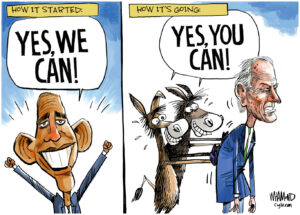Lost Decade … Lost Generation?
Sooner rather than later, the ethnically diverse, socially tolerant, technologically fluent Millennials will make a new nation. But what will they do with that power?
“Soaring Poverty Casts Spotlight on ‘Lost Decade’ ” was the lead headline on Tuesday’s New York Times.
The story, by Sabrina Tavernise, got worse, paragraph by paragraph. More than 46 million Americans were living under the government’s official poverty line. That was the highest number in the 52 years the Census Bureau has recorded such data.“This is truly a lost decade,” said Lawrence Katz, a Harvard economics professor. “We think of America as a place where every generation is doing better, but we’re looking at a period when the median family is in worse shape than it was in the late 1990s.”“Median income fell across all working-age categories,” reported Tavernise, “but the sharpest drop was among young working Americans, ages 15 to 24, who experienced a decline of 9 percent.”Enter the “Millennials.” That’s what sociologists are calling Americans born between 1982 and 2003. Those young people are now between the ages of 8 and 29. Trends and other numbers indicate they are going to take the hardest hit so far in these terrible economic times.This new generation is the pivot of the new book by Morley Winograd of the Annenberg Center for Communication Leadership at the University of Southern California, and Michael Hais, former vice president of Frank N. Magid Associates, the television consultants.In the book, “Millennial Momentum — How a New Generation Is Re-Making America,” Winograd and Haig make the assumption that this is a critical time of change for America, and these young people are the critical generation for better or worse. Their thesis is that just about every 80 years, in stressful times, a “civic generation” rises to meet the challenges of the day and turn American history in new directions. The hinges of history they cite are: the American Revolution, the Civil War, the Great Depression and World War II. In those crises a more significant and powerful United States emerged from the ashes. And they think that will happen again. Right now, Gen-Xers push aside the members and tenets of older generations. The inevitable disappearance (death) of the elders is the great driving force of change.© 2011 UNIVERSAL UCLICK
Dig, Root, GrowThis year, we’re all on shaky ground, and the need for independent journalism has never been greater. A new administration is openly attacking free press — and the stakes couldn’t be higher.
Your support is more than a donation. It helps us dig deeper into hidden truths, root out corruption and misinformation, and grow an informed, resilient community.
Independent journalism like Truthdig doesn't just report the news — it helps cultivate a better future.
Your tax-deductible gift powers fearless reporting and uncompromising analysis. Together, we can protect democracy and expose the stories that must be told.
This spring, stand with our journalists.
Dig. Root. Grow. Cultivate a better future.
Donate today.








You need to be a supporter to comment.
There are currently no responses to this article.
Be the first to respond.